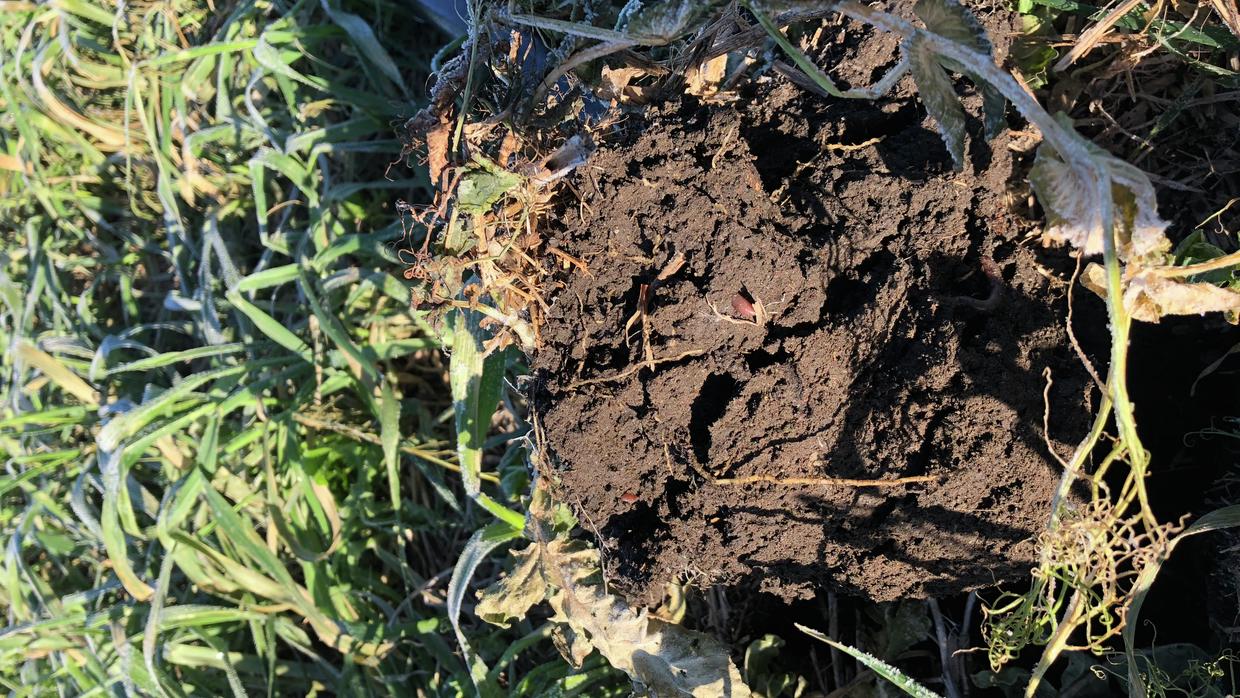“It’s got a lot of momentum,” he said of soil health in general and cover crops in particular.
Farming practices that promote soil health are drawing additional interest this summer in Minnesota because of the state’s Groundwater Protection Rule, set to go into effect Jan. 1, 2020.
The rule, decades in the making, will prohibit farmers from applying nitrogen fertilizer — frequently used by most conventional farmers — in some parts of the state at some seasons of the year. It also regulates application in areas where high nitrate levels occur in community water supplies.
There are a number of exceptions, according to the Minnesota Department of Agriculture website. They include allowing fall application of nitrogen fertilizer in vulnerable groundwater areas for perennial crops, to establish winter grains planted in the fall and for research on fields 20 acres or smaller.
More information on the rule: https://www.mda.state.mn.us/gwpr-faqs.
Growing consensus
Though the long-in-the-works groundwater rule has been controversial in Minnesota ag circles, there’s growing consensus that good soil health practices can help to address concerns associated with nitrogen use in the state.
Minnesota’s Sustainable Farming Association didn’t take a stance on the groundwater rule, but protecting the environment and prudent use of nitrogen fertilizer are long-time goals of the group, said Theresa Keaveny, the organization’s executive director.
What’s changed in recent years is the increased interest in soil health from farmers and other ag professionals in general. One sign of that: Anna Cates was named Minnesota state soil health specialist, a newly created position, a year ago.
“There’s so much enthusiasm from people wanting to learn more about soil health and cover crops,” she said.
Soil health is based on the premise that soil is a living organism that needs proper treatment to be healthy. Cover crops — ones grown to suppress weeds, control pests and disease and build productive soil, rather than for sale — are an important tool in promoting soil health.
Prudent use of nitrogen fertilizer, which among benefits can help to reduce a farmer’s production costs, should be a major consideration statewide, not just in the areas affected by the new groundwater rule, Cates said,
The key is wisely managing when, where and how much nitrogen is applied, she said.
Farmers in general, including members of the Minnesota Corn Growers Association, are increasingly focused on nitrogen management.
Since 2014, the organization has invested roughly $6 million through the corn checkoff in education and research to improve nitrogen management strategies, according to the group’s website.
The corn group also says:
• Corn farmers in the state have invested more than $270,000 in farmer-led research projects to improve nitrogen use.
• More than 600 farmers in the state have attended the University of Minnesota Extension’s Nitrogen Smart program, which helps farmers become more effective with their nitrogen use.
Programs, options
At least one program in the state provides an opportunity for farmers concerned with water quality.
Keaveny suggested farmers look into the Minnesota Agricultural Water Quality Certification Program, in which federal, state and local public sector entities, as well as private sector collaborations, provide certification services to Minnesota farmers.
The Minnesota Department of Agriculture describes the program as “a voluntary opportunity for farmers and agricultural landowners to take the lead in implementing conservation practices that protect our water. Those who implement and maintain approved farm management practices will be certified and in turn obtain regulatory certainty for a period of ten years.”
“This is a valuable program,” Keaveny said.
More information: https://www.mda.state.mn.us/environment-sustainability/minnesota-agricul…
And a special opportunity is available, for a limited time, to Minnesota farmers interested in planting cover crops.The U.S. Department of Agriculture’s Natural Resources Conservation Service is offering is an Environmental Quality Incentive Program, or EQIP, signup for farmers unable to plant their crops because of wet or flooded fields.
The special signup seeks to encourage farmers to plant cover crops to enhance water quality, hold down weeds and improve soil health on areas not planted to crops. The goal is providing an alternative to letting fields go fallow and uncovered.
The sign-up deadline is July 12. Interested Minnesota producers should contact their local NRCS office.
An NRCS spokesperson in Washington, D.C., said state NRCS offices generally set their own EQIP signup periods based on local conditions. Other states offering the special signup this summer include North Dakota, South Dakota, Iowa, Nebraska, Missouri, Oklahoma and Kansas, he said.
Farmers in those states should contact their local NRCS office for details.
Work with others
Inevitably, farmers across Minnesota — both in and out of the areas affected by the new groundwater rule — have varying degrees of experience with, and knowledge of, soil health practices, including cover crops, Cates said.
She encouraged farmers interested in learning more to get in touch with other farmers or ag professionals already familiar with soil health practices.
Chamberlin, who raises livestock, vegetables and value-added products, suggested that farmers and others interested in cover crops check out the Everything Cover Crops Facebook page, a public group that both cover crops and soil health in general.
“If you have questions, you can ask there (at Everything Cover Crops) and get answers,” Chamberlin said.
Minnesota agriculture in general still has a lot of work to do with soil health, he said.
“But we’re making progress. It’s great to see,” Chamberlin said.



















Graduated tax gives regular working folks a rare break